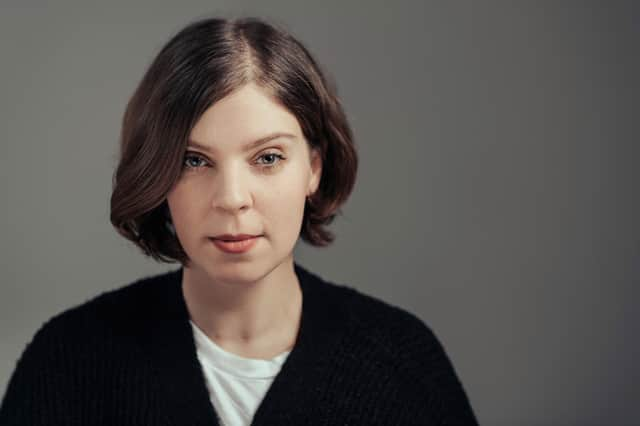Kolbrún Björt Sigfúsdóttir: ‘I'm drawn to the dark side of the human psyche’


Audiences are being treated to a double helping of director Kolbrún Björt Sigfúsdóttir at Glasgow's Tron Theatre this spring. No sooner has the dust settled on Me And My Sister Tell Each Other Everything, an excellently acted two-hander she presented in the studio, than she is moving into the main theatre to stage debbie tucker green's hang.
The scheduling is an accident of pandemic-related timing, but it provides a welcome opportunity to see one of Scotland's most intelligent young directors scale up. "I'm learning so much, which is great," she says. "Both of them demand precision from the actors and both are technically challenging, but in very different ways."
Advertisement
Hide AdIt's also a rare chance to see the work of tucker green, who has been celebrated in London since winning the 2004 Laurence Olivier most promising playwright award but little performed in Scotland. This is the Scottish premiere of hang, which opened at London's Royal Court in 2015, when it was described as "a play that simmers all the way to the boil".
In her plays and parallel film career, tucker green has been praised for her "urgent, angry accounts of the way we live now."
For Sigfúsdóttir, it means she has another subject in need of sensitive handling. Having dealt with mental illness and suicidal impulses in Me And My Sister Tell Each Other Everything, she is contemplating violence, retribution and trauma in hang.
Set in the near future, the three-hander is about a victim of an unnamed crime, played by Renee Williams, who is invited to decide the fate of the perpetrator who so wounded her family. What should the punishment be?
The woman – known only as Three – is traumatised by what has happened and has been further traumatised by spending long years in the legal system. She has suffered twice over thanks to a bureaucratic system indifferent to her needs. In Sigfúsdóttir's production, actors Saskia Ashdown and Pauline Goldsmith play apparatchiks more concerned with protocols than with offering genuine support. "The lingering, soul-destroying, reality-eroding effects of trauma are really well expressed here," says Sigfúsdóttir.
Sparingly written, the play raises knotty questions about vengeance, punishment and reconciliation. "It's an intense world to occupy," says the director. "The play asks if justice is achievable. Even if you could inflict the worst thing on the people who hurt you, would it be enough? Is there ever an equivalent response to the way somebody hurts you?"
Advertisement
Hide AdSigfúsdóttir, who also works as a playwright, is relishing the chance to get under the skin of another writer's work. Born in Iceland, she went to the University of Exeter for a masters degree in staging Shakespeare and then settled in Scotland. She is as happy working as a dramaturg on other people's scripts as she is writing and directing her own.
In a Zoom conversation with tucker green, she found they talked the same language. "She was amazing," she says. "She directed the play herself so it was a director-playwright to a director-playwright, going, 'How do you approach this?' She gave me some great insights into the mechanics of this piece. The musicality of it, the rhythms and the stop-and-starts only work at a certain pace. She was very helpful in saying, 'Here's how you tackle this.'"
Advertisement
Hide AdOn the surface, it is not easy to see the thread that binds Sigfúsdóttir's work together. With her own Brite Theatre, she has staged one-person versions of Richard III and Hamlet, as well as dance-theatre pieces and site-specific work.
Different again is her work as an assistant director. She supported Zinnie Harris, another writer-director, on Caryl Churchill's A Number at Edinburgh's Royal Lyceum; Gareth Nicholls on David Ireland's hit Traverse comedy Ulster American; and Matthew Lenton on Vanishing Point's The Metamorphosis.
During lockdown, she created the beguiling Deliverance, a script handed to participants on their doorsteps. In an era of social distancing, each was left to enact the show alone at home. It was theatre as me time, a solo show custom built for the Covid era.
Then there was the finely tuned actor-centred staging of Uther Dean's Me And My Sister Tell Each Other Everything, in which she made space for riveting performances by Eilidh Loan and Anna Russell-Martin.
"I love character work and I love relationships on stage," she says. "In Me And My Sister, it was really important to believe these two people were sisters. That comes down to body language, intonation and the ability to finish each other's sentences. It's a crazy text in what it demands of actors in a way that hang also is – the seemingly natural flow of language is really tricky. I'm very interested in precise flow of language. It's one of the reasons I did a Shakespeare degree."
It adds up to a mix that is hard to categorise. Sigfúsdóttir, though, sees a clear connection between the shows she has done. "None of them are straight-up comedies but a lot of them are funny," she says. "I'm drawn to the darker side of the human psyche – a fascination with Nordic noir! None of them are big casts, to the point of Deliverance having no audience. There are a lot of female narratives and a focus on gender. They are character-driven and intense, taking place in contained worlds. They are eclectic, but I can see how they tie in together."
Hang, Tron Theatre, Glasgow, 28 April–7 May, https://www.tron.co.uk/